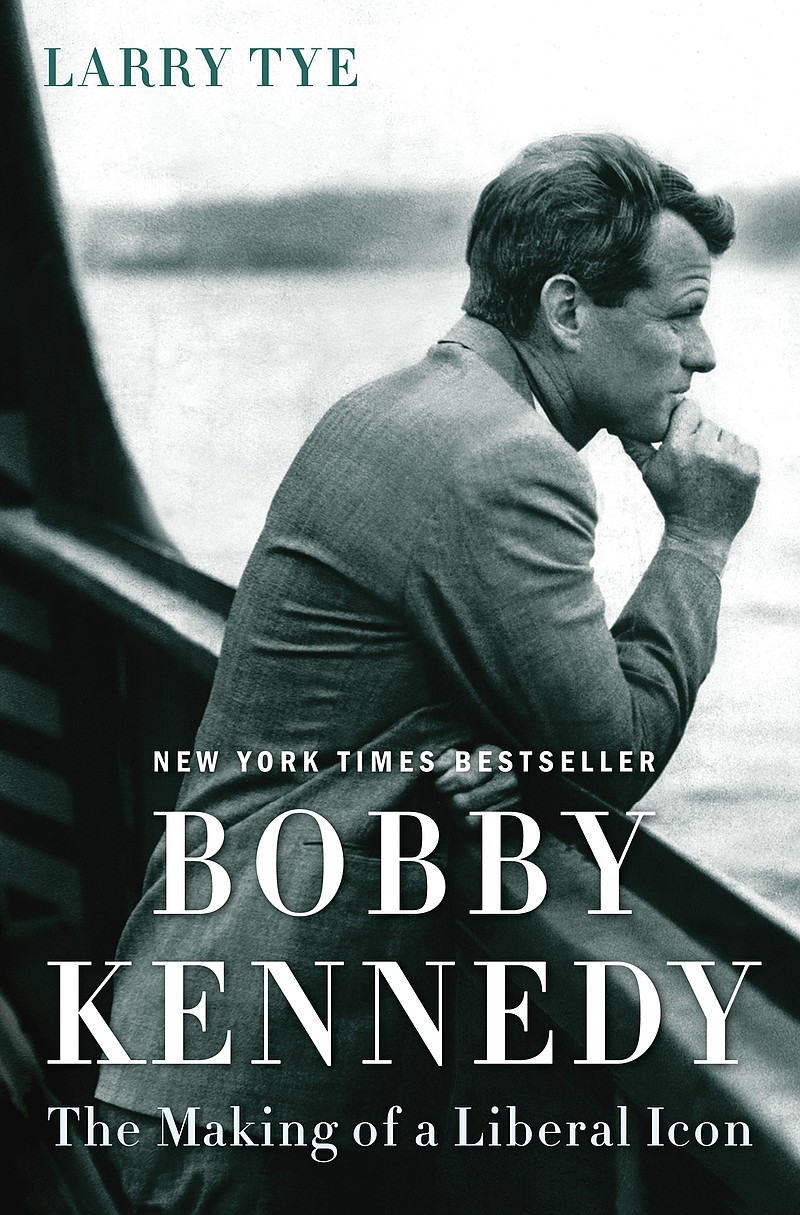Unless you were old enough to remember the mid-1960s it might be hard to grasp the considerable impact the Kennedy family, particularly Sen. Robert F. Kennedy and the widowed first lady, Jacqueline, had on both the popular imagination and political discourse in the United States-and, arguably, the world. Everything they did seemed to be news, even if it was just Jackie sporting a miniskirt in public (Fall 1966 and "cautious housewives over 30" followed suit, The New York Times noted later). This intense level of scrutiny, sparked by President John Kennedy's 1963 assassination and fueled by a yearning both for what once was and might just be again, kept the Kennedys in the spotlight.
Patience was not a virtue in the 1960s. The decade was all about change: Wonderful, horrific, bewildering, logical-often all at the same time. Into that world and time strode Robert Kennedy. He was, as Larry Tye's new biography, "Bobby Kennedy: The Making of a Liberal Icon," shows, a man on a mission even if he wasn't, perhaps, fully aware of where the mission would go.
"Some people see things as they are and say why?" Kennedy would famously say, paraphrasing George Bernard Shaw. "I dream things that never were and say, why not?"
Tye's well-researched and carefully sourced book details how Kennedy used such forward thinking to address the major issues of that rapidly evolving decade. He saw change coming and turned to meet it.
"A revolution is coming-a revolution that will be peaceful if we are wise enough, compassionate if we care enough, successful if we are fortunate enough, but a revolution that is coming whether we will it or not," Kennedy wrote.
While that "revolution" wasn't as great as the Left hoped for and the Right feared, America was a profoundly different place at the end of the decade than at the beginning. Tragically, Robert Kennedy would not live to see the country he was working so hard to change.
Kennedy's assassination in 1968, minutes after winning the California Democratic primary for president, cruelly cut short a life that, as Tye so carefully lays out, was one in progress. Kennedy began as a man who, as Tye notes, saw things starkly in basic terms, like good and evil, working for Sen. Joseph McCarthy, the Wisconsin Republican who fueled a Communist witch hunt; laboring tirelessly-ruthlessly, his critics famously said-to get his brother into the White House; and doing anything to score an administration win. At the end of his life, Kennedy was increasingly his own man who, matured by grief and more open to life's complexities, had become an eloquent champion for the poor and the oppressed.
RFK's record on civil rights, his wrangling with the Russians over Cuba, his crusade against organized crime, how he waged various Kennedy campaigns are all examined in this book. It's clear Kennedy's metamorphosis to "liberal icon" didn't happen immediately or easily. Along the way, Kennedy amassed a formidable list of people who disliked or hated him, including Frank Sinatra, Secretary of State Dean Rusk, FBI Director J. Edgar Hoover, writer Gore Vidal, Sen. Eugene McCarthy, Teamsters President Jimmy Hoffa and President Lyndon B. Johnson. Yet, he was able to win over countless others because he had the courage to change, to evolve and to respond.
A 1967 Jules Feiffer cartoon about the "Bobby Twins" is held up by Tye as best representing the "push-pull" of Kennedy's character: "The Good Bobby is a courageous reformer. The Bad Bobby makes deals. The Good Bobby sent federal troops down South to enforce civil rights. The Bad Bobby appointed racist judges down South to enforce civil rights. The Good Bobby is a fervent civil libertarian. The Bad Bobby is a fervent wire tapper. The Good Bobby is ill at east with liberals. The Bad Bobby is ill at ease with grownups."
Tye is a Massachusetts-based author and journalist who writes in the book's preface, "I have been captivated by Bobby Kennedy since I was in high school."He notes he covered the family "repeatedly" for the Boston Globe and interviewed members of the Kennedy family, including RFK's widow, Ethel. Tye presents a balanced portrait of his subject that gives equal due to Kennedy's achievements and failures (I suspect die-hard Kennedy haters still won't be satisfied) in and out of the public eye.
"No family in American history has been subject to more gossip, hearsay, and embellishment about their private affairs than the Kennedys," Tye writes. "Prurient interest aside, they opened themselves to it by asking for the public's trust and votes. JFK's illicit sex and cover-ups confirmed our distrust. The question is fairly asked about Bobby, too, precisely because he publicly prized conjugal faithfulness and chided those who didn't practice it."
Readers looking for titillation or confirmation of rumors long bandied about will likely be disappointed. Tye dispassionately presents the claim, looks for proof, concludes that "no one knows for sure what happened when the doors were closed," and moves on.
In a sense Tye has to keep going, for Robert Kennedy's life moved too quickly to allow the biographer to linger long in the bedroom. And short, how short, his life was. Dead at 42-how could Kennedy have done so much, so fast, so young? One still marvels-and mourns: the great rounded arc of a long life well-lived was not to be his.
"Half Che Guevara, half Niccolo Machiavelli, Bobby was a shaker-upper dedicated to the art of the possible," wrote Tye in his book's preface. "That he could change so substantially and convincingly over the course of his brief public life helped restore a changing America's faith in redemption. In the end he could become this nation's high priest of reconciliation precisely because he had once been the keeper of our darkest secrets."

